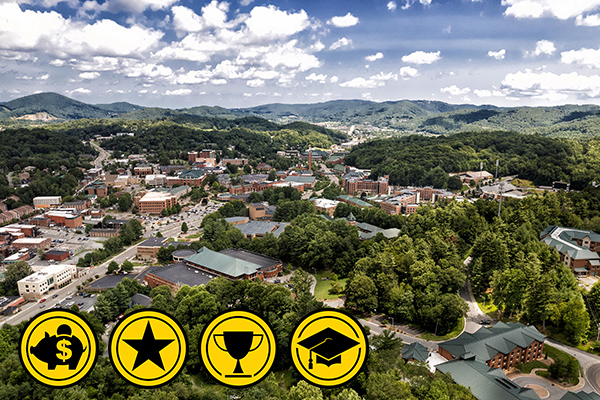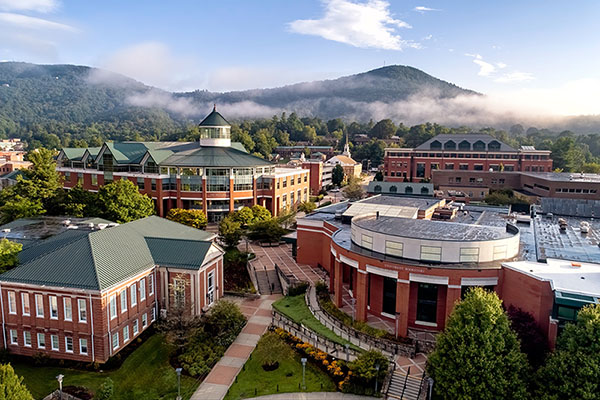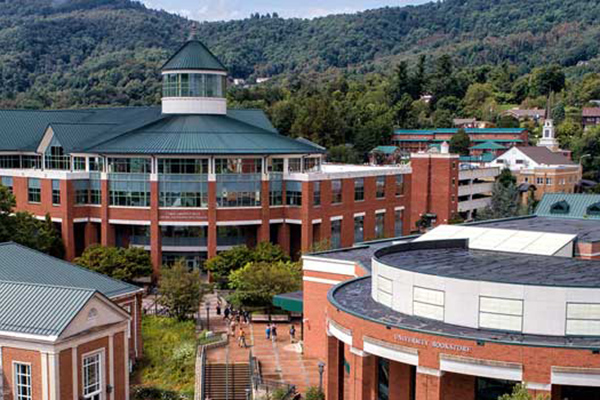BOONE, N.C. — With a continued focus on strategic growth, Appalachian State University maintained strong enrollment this fall, welcoming 20,436 students. This class includes the most diverse student body to date, with 18.6% of the total population being racially and/or ethnically underrepresented students.
“Serving the needs of our state and region continues to be a priority at App State,” said App State Chancellor Sheri Everts. “Our stable enrollment of rural, first-generation and transfer students, along with an increase in App State Online student enrollment for the third consecutive year, reflects App State’s commitment to balancing growth with access for all who are prepared to succeed. This further speaks to the dedication and excellence of our faculty — who teach and mentor — and the staff who support our students along their educational journeys.”
Underrepresented student enrollment reaches historic high
Official enrollment numbers for fall 2022 show continued progress in broadening representation among the university’s students to better reflect the state population.
With 3,770 underrepresented students enrolled for the fall semester, App State welcomed its most diverse student body in university history — for the eighth year in a row. These students comprise 18.6% of the entire student population.
Of all the racially/ethnically underrepresented student groups at App State, the Hispanic/Latine population is the largest, representing 8% of the student population, and has grown significantly since Chancellor Everts’ arrival in 2014, increasing by 123%.
Under Everts’ leadership, App State has increased its total underrepresented student population by 66.4% since 2014, and, in the same time period, it has more than doubled its first-year underrepresented enrollment — a 100.5% increase.
First-year enrollment remains steady
App State enrolls 3,917 first-year students for fall 2022 — the second largest class in the university’s history. Of these students, 756, or 19.4% of the total first-year population, are underrepresented first-year students, making this the most diverse first-year class in university history.
Strong undergraduate enrollment
Nearly 20,500 students compose the second largest class in App State’s history.
Of the total undergraduate population, 31% — or 5,714 — are first-generation students.
The university’s overall 2022 first- to second-year retention rate — a primary performance indicator for institutions across the country — is 82.9%.
3rd consecutive year of online enrollment growth, vet tech program welcomes first class
For the third consecutive year, App State has experienced growth in online student enrollment, with 1,752 undergraduate and graduate students enrolled in App State Online programs this fall. This marks an 8.8% growth in online students from fall 2021 to fall 2022. App State Online students compose 8.6% of the university’s total student population.
App State welcomed an inaugural class of approximately 100 students to its new Bachelor of Science in veterinary technology degree program this fall. The four-year program — aimed at addressing the shortage of veterinary professionals across the state and region — provides students with on-site, supervised clinical training. It was developed through a partnership between App State and Banfield Pet Hospital®.
3rd largest graduate enrollment in past 10 years
App State’s 1,878 enrolled graduate students for fall 2022 compose the third largest graduate class in the past 10 years.
This summer, the university announced its new Master of Science in occupational therapy (OT) program, which received approval from the University of North Carolina Board of Governors in April. The program, to be offered through App State’s Beaver College of Health Sciences, will help address a critical lack of occupational therapists in Western North Carolina.
Supporting the transfer student population
App State welcomes 1,498 new transfer students this fall — a population that makes up 7.3% of the overall student body.
Through its Aspire Appalachian program, App State provides a seamless pathway for students enrolled at nine partner community colleges to complete their degrees at the university.
Transfer students are also supported — through all stages of their App State education — by the dedicated staff in Transfer Admissions and Engagement.
In 2021, App State dedicated Mountain Laurel Residence Hall for transfer students. It can accomodate 248 students in hotel-style rooms and features laundry facilities, air conditioning, a large lobby, meeting spaces, a communal kitchen and a university-owned market.
Serving rural students
The university enrolls 5,567 in-state, degree-seeking undergraduate students from rural populations. These students compose 30.1% of the in-state, degree-seeking undergraduate student population at App State.
As a rural-serving institution, App State is committed to increasing enrollment of students from rural populations and ensuring their timely graduation.
The Alliance for Research on Regional Colleges, housed in App State’s Reich College of Education, is dedicated to advancing research and providing insight into the role of regional and rural-serving colleges and universities. Its faculty researchers, which include App State’s Dr. Andrew Koricich, associate professor in the higher education program, have received national recognition for their work to develop a tool that uses evidence-based criteria to define what it means to be a rural-serving institution.
As pandemic eases, foreign national student enrollment increases
According to a recent report by the Institute of International Education, numerous higher education institutions across the U.S. reported an increase in international student applications for the 2022–23 academic year, and App State is no exception.
Enrollment of foreign national students at App State, which includes degree-seeking international students, has increased by nearly 40% since fall 2021, with 156 foreign national students enrolled this fall.
The Office of International Education and Development (OIED) spearheads the internationalization efforts at App State, providing support and resources that empower campus and community members to engage in global experiences. OIED also supports international students who study abroad at App State.
Areas of potential enrollment growth
The areas with the most potential for App State’s future enrollment growth are App State Online programs and the university’s satellite locations.
Beginning in fall 2023, the university will expand public higher education access and outreach in the Hickory-Lenoir-Morganton Metro Area with the opening of its App State Hickory Campus. Since the purchase of the building in November 2021, Chancellor Everts and her leadership team have been meeting regularly with state and local government officials and education and business leaders to ensure the university is envisioning the best academic support to meet the needs of the region.
The university’s increase of underrepresented and online students, as well as the planned expansion in the Hickory area, support Gov. Roy Cooper’s legislative target of equipping 2 million additional North Carolinian adults, ages 25–44, with a high-quality postsecondary degree or credential by 2030.
Enhancing campus infrastructure to empower human potential
To complement and support its enrollment growth, App State continues to develop and enhance its physical infrastructure — a high priority for Chancellor Everts.
“I care about building and enhancing our physical infrastructure because our students, faculty and staff live out their academic lives here. It is important to support and empower their many achievements and vast potential,” Everts said.
In August, the university opened New River Hall — the fourth and final residence hall of its $191 million P3 student housing project, with all buildings completed on time and on budget. The project has replaced nearly 1,800 beds — and added 500 more — while also providing better, more efficient parking.
App State also completed the expansion of its Child Development Center in time for the new facility to open for the fall 2022 semester. The center offers high-quality, affordable child care to App State faculty, staff and students, as well as local community members, and, through the expansion, is licensed to serve an additional 54 students.
The university is also planning a public-private partnership to develop faculty and staff housing units, which will help meet App State employees’ housing needs amid housing scarcity and cost inflation in Boone. Construction for this housing, which is part of the Innovation District project, is slated to begin in winter 2023 and conclude in 2025.
More information on the university’s campus construction projects is available on the App State’s Future website.
All numbers reported reflect App State’s fall 2022 census data as of Sept. 2. The University of North Carolina System Office determines the census date to be the 10th day of each fall and spring semester, by which all students should be registered for all of their courses for the semester.
What do you think?
Share your feedback on this story.
U.S. News & World Report, The Princeton Review, Forbes magazine and Money.com all agree — App State is an educational leader for the U.S. and Southeast
About Appalachian State University
As a premier public institution, Appalachian State University prepares students to lead purposeful lives. App State is one of 17 campuses in the University of North Carolina System, with a national reputation for innovative teaching and opening access to a high-quality, cost-effective education. The university enrolls more than 21,000 students, has a low student-to-faculty ratio and offers more than 150 undergraduate and 80 graduate majors at its Boone and Hickory campuses and through App State Online. Learn more at https://www.appstate.edu.
















